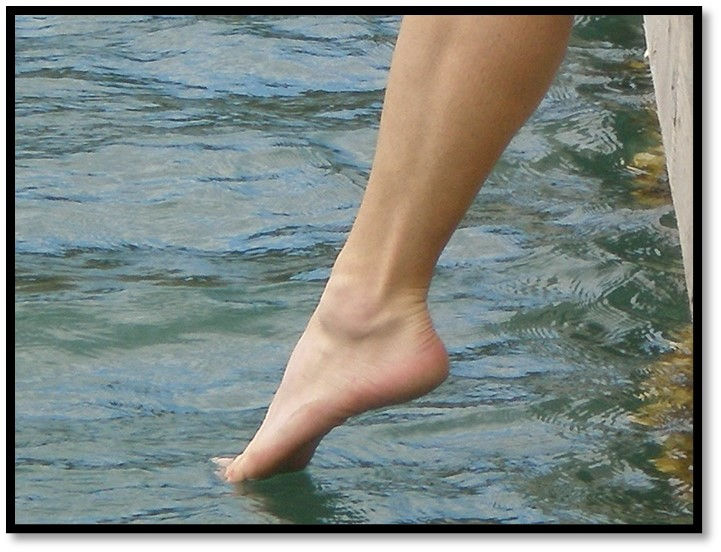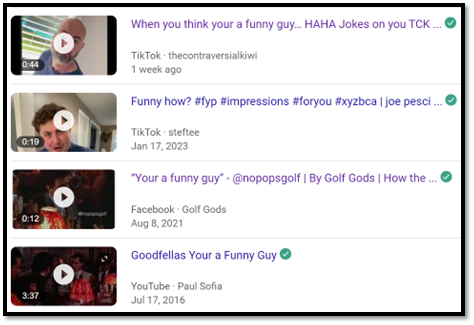Your So Vain
"Carly Simon has [revealed] who the song 'Your So Vain' is about ...."
—Kool 101.7, Diluth, Minnesota
Yikes! What’s happening to our language?
Here's a quick, 30-second discussion._________________________________________
Toe-in-the-Water Discussion

It’s grammatically incorrect to write the title of Carly Simon’s song as “Your So Vain.” The correct way is “You’re So Vain.”
The word your is a possessive pronoun, as in “your house” or “your iPhone.” If you write “Your So Vain,” you’re leaving out the verb are.
The word your does NOT mean “you are.” To get the verb are into your sentence, you must write “you’re,” which is the contraction for “you are.”
And here's a more detailed analysis.__________________________________________
Deep-Dive Discussion

On Kool 101.7, a classic-hits radio station in Diluth, Minnesota, we finally discover who was on her mind when Carly Simon wrote the 1972 hit “You’re So Vain.”
Who was it?
Warren Beaty.
As shown on the screenshot below, Kool 101.7 announced this breaking news like this:
Carly Simon has reviled who the song "Your So Vain" is about, it just might surprise you. With her upcoming memoir "Boys in the Trees" the question has come up again on who the song is about and she thinks its crazy that People want to know.
So who is the first reviled? Mick Jagger, Cat Stevens, Jack Nicholson or Warren Beatty?
Oh My Goodness. Where to Begin.
I’ll start with the obvious question: How on earth did a major broadcasting company let this slip by its review of website content?
For present purposes, let’s ignore:
the grotesque misspelling of revealed (reviled) (For sure, the song poked fun at Warren Beaty, but it didn’t revile him.)
the its instead of it’s
the inexplicably capitalized People
the second misspelling of revealed (proof positive a typo wasn’t responsible for this comedy of errors)
“Your Making" a Big Mistake
Instead, let’s look at the monster itself. The omnipresent “Your So Vain.”
If you came to WriteCorrectly.com in search of information about effective writing, then YOU are probably NOT making the “Your So Vain” mistake. But I’d bet you know quite a few people who do make this mistake. Or you see a lot of people misusing your on social media when they challenge someone by writing, “Your a moron.”
Or, as shown on the screenshot below, you see people naming their videos on Tik Tok, Facebook, and YouTube “Your a funny lookin thing,” “When you think your a funny guy,” or “Your a funny guy.”
Or you see the monster lurking on a website enabling you to ask legal questions to a lawyer. And there it is—on the screenshot below—blowing up the English language:
If your a victim of identity theft fraud ….
So, Ed, What’s the Grammar Here
It’s unfortunate, but millions of people learn the English language primarily by hearing it, not by reading it, and certainly not by studying it. So they hear the song, “You’re So Vain.” And, lo and behold, that sounds like “Your So Vain.” So they write what they hear, “Your So Vain,” “Your a Funny Guy,” or “Your a victim.”
Now those who jotted down a few notes in their middle school English class recognize the word your as the second-person possessive pronoun, as in, “This is your book.”
They know that this word will always be followed by something that is possessed. From the class on nouns, they know that persons, places, things, or ideas can be possessed. They therefore know that the word your will always be followed by a noun.
Your mother (person)
Your home (place)
Your iPhone (thing)
Your happiness (idea)
The notetakers also know that every sentence needs to have a verb in it. They thus know that “Your a funny guy” has no verb. They know that the word your is just a pronoun. They know it is definitely not a contraction of the words you are. Thus, because they took notes, they know that “Your a moron” describes not the target of that sentence, but, sadly, its speaker.
The Contraction of “You Are"
Well, Carly Simon did sing “You're so vain,” and it sounded like "Your so vain." The song just would not have hit the charts if she had sung, “You are so vain.” So she wrote the “you are“ in the contracted form: “You’re So Vain.” But she sang it like everyone sings it: “Your so vain.” You can listen to the song on YouTube here.
The contracted form you’re produces a construction of the verb to be. In the online course Write Better Right Now, registrants learn all about the verb to be and the damage it causes to a person's writing style. They would spot these structures in an instant and recognize the "Your So Vain" problem.
So those who do have the “Your So Vain” problem should watch out for these constructions of the verb to be:
You are plus a noun
You are plus an adjective
You are plus a phrase
You are plus an -ing verb
Please Study the Following Table
Pronoun | to be | Addition | Example | Bad Result |
You | are | noun | a moron | Your a moron. |
You | are | adjective | crazy | Your crazy. |
You | are | phrase | in trouble | Your in trouble. |
You | are | -ing verb | driving | Your driving too fast. |
You can get away with making this mistake in speech, for people can’t distinguish your from you’re very easily. But when you commit the blunder in a report or email, educated readers will spot the error and think much less of you.
_____________________________________________
Stay Tuned
Visit WriteCorrectly.com again soon. In the next Write Better Blog, I’ll review another mistake made by people who write what they hear, not what they read, and not what they (should) study.
They should of paid closer attention to their middle school English teacher. 😊
—C. Edward Good
Screenshots
Kool 101.7
Your a Funny Guy

Your a Victim


